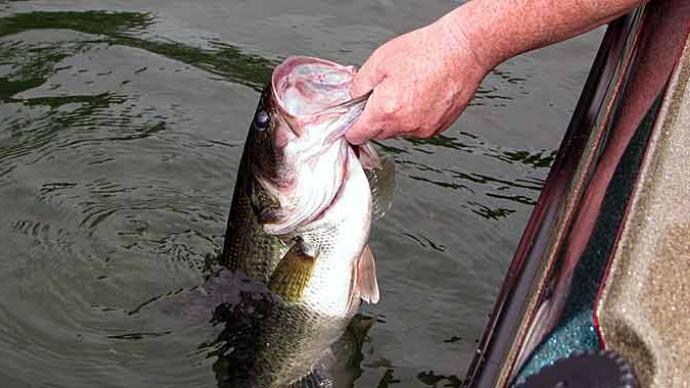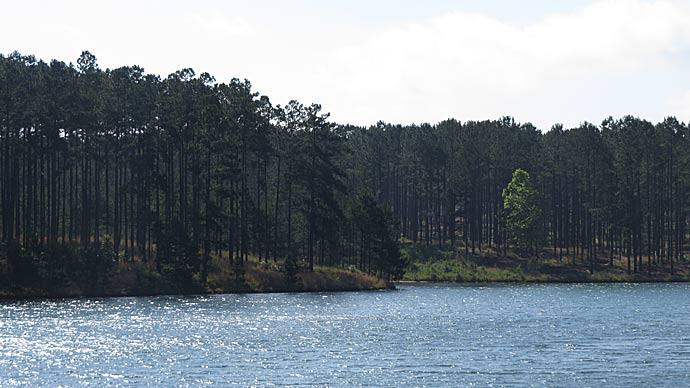
Of the many things he's been called, from outlandish and outrageous, to outspoken, most of it is true. Ray Scott has been called the bass god, a charismatic promoter, and an idealist. Descriptions of him as a rugged cowboy with bright eyes and the air of an Old Testament prophet hold a lot of water. He's all of those things and more. It's the more I want to tell you about because he's also one other thing. He's a friend of ours. That's Jerry's and mine and all fishermen.
I like an up-front kind of person. Say what you mean, mean what you say, and you and me, partner, why we'll get along just fine. You can depend on people who speak their minds because they don't hide their feelings or hold things back. That's one of the reasons Ray and I get along so well. He doesn't mind when I speak my mind, and he's more likely than most to speak his to anyone on any subject you choose.
The most provocative subject he speaks his mind about these days is the use of poison to eradicate aquatic vegetation, which for some of us, equates as valuable bass habitat. It's a subject he and I agree on completely. It's also a subject that has caught fire from a few not-so-friendly advocates of using chemicals. We won't talk about old friends who appear to be on the wrong side of the fence right now. I'll talk about that later.
| "Chemical poison herbicides should not be used to control and manage aquatic vegetation in public waters until, or unless, every non-toxic mechanical or manual method has been completely exhausted, period!" - Ray Scott. |
Ray and I recently discussed the continuing battle to preserve freshwater and fish habitat in Texas. But, of course, you've been reading about this subject on BassResource for decades. His opinion, and that of the longest-running, hardest fighting advocate of clean water and habitat preservation, Harold Sharp of Chattanooga, Tennessee, is that use of any chemicals is often unnecessary and most likely unhealthy - even though touted as perfectly harmless by the companies that brew them up.
"Chemical poison herbicides should not be used to control and manage aquatic vegetation in public waters until every non-toxic mechanical or manual method has been completely exhausted, period! " says Scott.
Hallelujah, brother Ray! I'm with you. Where do I get my fringed jacket and white cowboy hat?
This man is well-read and educated on clean water and fish habitat and defines the acceptance of unnecessary chemical use as a typical bureaucratic deployment.
"Most people pulling the strings have connections and receive rewards for promoting these products. It's a terrifying proposition among politicians, scientists, and fishery managers. Until the ties that lock them together are broken, chemical use will continue. There are classic examples of this all over the country.
"I've been working to help in Texas because, much like my home state of Alabama and many other states, the laws that govern poisons are pretty lax. If you or I wanted to buy the stuff and dump it in the lake, that's just what we could do. Someone else could dump the same, or another brand, of poison. Before you know it, you've got a very unhealthy soup. The sad part is nobody is breaking the law. EPA approved is supposed to mean it's okay, but the container labels state 'use only as directed.' Without laws, no one oversees use by others, and overdose occurs. In Florida, two or more different agencies poisoned the Harris Chain of lakes, not knowing what the others had done. The fish, the quality of the water, and the fishing were negatively affected.
"It's easy to understand. If I were going to get a haircut, I wouldn't sit in the barber's chair and tell him to pour acid on my head to remove all the hair. I'd tell him just to give me a trim now, and I'll be back in a month for another. You wouldn't pull your hair out by the roots or eradicate it just because it had gotten too long."
While the controversy rages because hydrilla is a non-native species that can become bothersome if it overgrows, Scott says, "It's here. You're not going to make it go away. No one will ever kill all the hydrilla or aquatic plants. The best plans are for management and controls that provide healthy conditions for the lakes, the fish and other animals that rely on the habitat, and the humans. I don't believe that poisons are healthy. They kill; that's why they have danger warnings all over the packaging."
Too much the gentleman to discuss, or cuss, the continuing poor behavior of his old compadres' at Bassmaster®; Ray says he holds no ill will. But I sure hope he "tells all" in his autobiography, BASS BOSS, which is due out any time now. They've been trying their best to give him that acid haircut he mentioned. Comments printed recently by the editor left no doubt in my mind that they'd like to have anglers think the tradition has continued at B.A.S.S. I say that's impossible. Without Ray, it's just not the same. Ray Scott was the tradition at that organization, and none of those left behind can ever hope to be what he is to bass fishing and conservation.
A classic example of this can be found in their claims of a full-time conservation director on staff. The implication is pretty hollow if you ask me. The guy's a chemical advocate. He swears by the use of poisons to control overgrown aquatic vegetation. Now, how conservation-minded is that? I sure feel safe knowing that the guy in charge of environmental issues for B.A.S.S.®; is in favor of nuking everything, don't you?
| I heard a rumor that some anglers have asked him to start a new organization similar to the old B.A.S.S. |
I believe Ray is disappointed in what has happened to the organization he built from an idea and the thread of fundamental principles for sportsmen. He has every right to be. The environmental differences between him and the folks running B.A.S.S. have caused the rift and the left-handed pseudo-praise comments coming from them these days. But I also know he's a man of conviction and believes that what we're all doing to stop the use of poisons is excellent and right. So, just like those of us battling here in Texas for clean water and the preservation of bass habitat, he just ain't going to' quit.
I like his recipe for clean water and healthy habitat. In answer to those who say harvesters can't be used in shallow water, he says landowners can hire the same kid that mows their lawn. "Twenty bucks, a garden rake, and the kid next door can solve that problem easily. Vegetation is growing in areas where there are stumps, and experts say you can't get a harvester in there; well, leave them alone! Water users such as sailboaters can't get there anyway, but the fish use that habitat as an array. If vegetation is growing under your dock, mow the outside sure, but leave it underneath - it's the best fish-holding stuff in the world.
"Get someone to tell me why the only way to control and manage aquatic vegetation is through chemical poisons. For every excuse they come up with, it all still goes back to who is making money. So many scientists studying aquatic vegetation in this country have received money, directly or indirectly, from chemical companies. Can they be unbiased when chemical companies are a major funding source?"
He bet me his cowboy hat against my oldest pair of bedroom slippers that we couldn't find one that hadn't in some way or other been influenced by chemical money or complimentary gifts. I won't take that bet. I'm fond of my old slippers and have no intention of shipping them off to Alabama. "Anything that starts with the word too is bad. Too much sugar in your coffee, too much grass in the lake. What's the solution? I can tell you it isn't an acid haircut. That's too much, too."
Like all the great fighters I know, from Jerry Dean to Terry Oldham to Robin Richardson, I'd follow this man into any battle. Then, when the bullets fly, he can expect to find me wherever he needs me to be.
I heard a rumor there's a ground-swell of folks in Texas and elsewhere asking him about starting a whole new organization for bass anglers similar to the old B.A.S.S. While he's heard the remarks, he isn't commenting. It would be wise, though, for the folks at his old fraternity to think twice about their conservation ideals and poison advocacy.
Starting a new career is just in line with his thinking these days. Writing his autobiography and working on conservation efforts - from the right side of the fence - keep him pretty busy. The people in this state may never know how significant his influence has been here. With his power, reaching the governor was a whole lot easier. He's using his power for the good of all anglers. His contacts are vast, and the influence he can bear on issues such as chemical use is likely to be one of the most valuable assets the anglers in this country have. It has already been so in this little corner of the woods.
| "New laws governing the use of poisons will only help if you don't give away the farm trying to compromise over one pig" - Ray Scott. |
Ray Scott is still a man of vision, eyes wide open and looking at the world, knowing that it is the only one we have. "All the folks that have come together to fight this thing in Texas have to stay strong and remain committed to the ideals and principles that induced the unification in the first place. When that many people are against using poisons to kill aquatic vegetation, you have the strength to follow through and accomplish what's needed. New laws governing poisons will only help if you don't give away the farm trying to compromise over one pig."
If they tell me that they want to poison 35 acres in a lake, but they're only going to do 15, I say, what the hell are you doing for then? It doesn't make sense when other ways are better, healthier, and less expensive in the long run for all concerned."
Harold Sharp, the second-ever BASS member and founder of the first affiliated BASS chapter (1968), is another of the insightful men in this country. He has fought for clean water and habitat for many years and taught Ray well about the effects and politics of poisons.
"Get Harold to tell you about his little war over poisons and fresh water with the government. Money and influence on the other side of the fence make it a long and bloody battle that we may never see the end of. But, surely we won't if we give up."
I've already reserved a copy of his autobiography for our library. We even told him we'd be proud to pay for our copy. But, with the strongest wish of my heart, I hope that when people read it, they know the Ray Scott that Jerry and I know - the man we consider a good friend. For all his wild and extraordinary ways, he's a plain man with basic and straightforward ideas about how we should treat this planet, the people and creatures that live here, and he knows what the word respect means. He gives it every day of his life to everyone he meets.
Editor's note: Sadly, Ray Scott passed away in 2022. We lost a legend and a great man and will miss him greatly.


